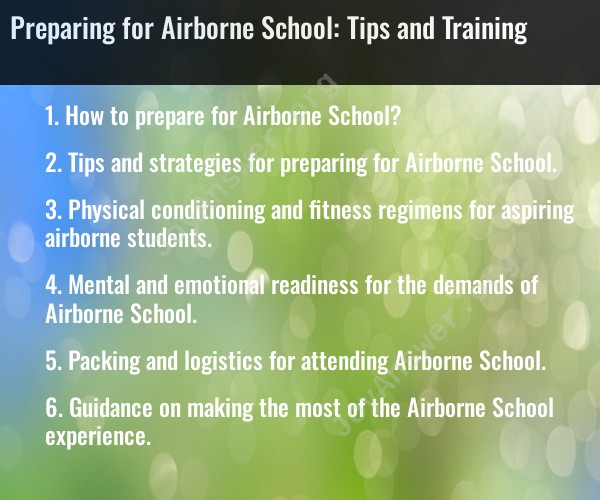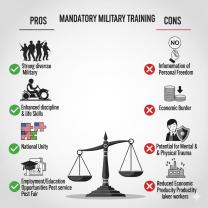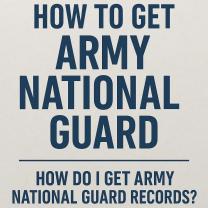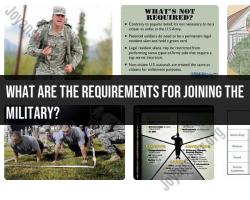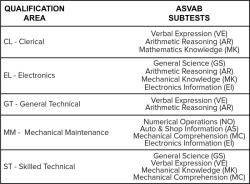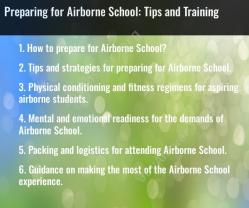How to prepare for Airborne School?
Preparing for Airborne School is essential to ensure that you have the necessary physical fitness and mental readiness for the challenges of parachute training. Here are some tips and training recommendations to help you prepare for Airborne School:
Meet Fitness Standards:
- Ensure that you meet and exceed the physical fitness standards of your branch of service. This typically includes performing well on the Army Physical Fitness Test (APFT) for Army personnel. Focus on improving your strength, endurance, and overall fitness.
Run and Cardio Training:
- Running is a critical component of the physical training at Airborne School. Incorporate regular running into your fitness routine to build stamina and endurance. Aim for long-distance runs and interval training.
Strength Training:
- Develop your upper body, core, and leg strength, as you will be required to carry equipment and parachute gear. Bodyweight exercises, weightlifting, and functional strength training are beneficial.
Practice Pull-Ups:
- Strong upper body and grip strength are essential for successful parachute landing falls (PLFs). Practice pull-ups to improve your upper body strength.
Ruck Marches:
- Get accustomed to carrying a heavy load over distance. Practice ruck marches with a weighted backpack or equipment similar to what you'll use at Airborne School.
Focus on Running and Landing Techniques:
- Learn and practice the Army's running and landing techniques, which are used to safely land after a parachute jump. Proper form can help prevent injuries.
Mental Toughness:
- Airborne School can be physically and mentally challenging. Develop mental resilience to cope with the stresses of training. Visualization and mental imagery techniques can help.
Study Pre-Jump Training:
- Familiarize yourself with the pre-jump training and procedures you'll encounter at Airborne School. Understand the proper parachute landing fall (PLF) techniques and practice them.
Pack a Parachute:
- If possible, receive training on how to pack a parachute. Many attendees at Airborne School pack their own chutes. Familiarity with this skill can be an advantage.
Healthy Lifestyle:
- Maintain a healthy lifestyle by getting sufficient sleep, eating a balanced diet, and staying hydrated. Good nutrition and rest are crucial for peak performance.
Hiking and Terrain Familiarization:
- Practice hiking and navigating various terrains to improve your endurance and adaptability.
Consult with Experienced Jumpers:
- Seek advice from individuals who have completed Airborne School or are experienced parachute jumpers. They can provide insights into what to expect and offer valuable tips.
Stay Informed:
- Stay up to date on any changes or requirements specific to your branch of service and the particular Airborne School you'll attend.
Prepare for the APFT:
- Train specifically for the Army Physical Fitness Test (APFT), which includes push-ups, sit-ups, and a timed two-mile run. Practice these exercises regularly to excel on the test.
Gear Inspection:
- Ensure your uniform, equipment, and footwear meet Airborne School standards. Familiarize yourself with the required gear and inspect it regularly.
Remember that Airborne School is physically demanding, and your safety during parachute jumps is paramount. The more you prepare physically and mentally, the better your chances of success at Airborne School. Additionally, consult with your unit's leadership and instructors to get specific guidance and requirements for your branch of service.
Tips and strategies for preparing for Airborne School
Here are some tips and strategies for preparing for Airborne School:
- Get in top physical condition. The Airborne School curriculum is physically demanding, so it is important to be in good shape before you start. Focus on building your cardiovascular fitness, strength, and endurance.
- Familiarize yourself with the Airborne School curriculum. You can find this information on the ARRTB website. This will help you to know what to expect and to prepare for the specific challenges of the course.
- Practice your parachute landing fall (PLF). The PLF is a technique for landing safely from a parachute. You can practice your PLF on a soft surface, such as a gymnastics mat or a sandpit.
- Develop a positive attitude. Airborne School is a challenging course, but it is also a rewarding one. Stay positive and focused throughout the course, and never give up.
Physical conditioning and fitness regimens for aspiring airborne students
Here is a sample fitness regimen for aspiring airborne students:
- Cardiovascular fitness: Run at least 3 miles three times per week. You can also incorporate other cardiovascular activities, such as swimming or biking, into your routine.
- Strength training: Perform two full-body strength training workouts per week. Focus on compound exercises that work multiple muscle groups, such as squats, deadlifts, bench presses, and pull-ups.
- Endurance training: Perform one endurance workout per week. This could involve running a longer distance, hiking, or swimming for a longer period of time.
Mental and emotional readiness for the demands of Airborne School
Airborne School is a mentally and emotionally challenging course. Here are some tips for preparing for the mental and emotional demands of Airborne School:
- Visualize yourself succeeding. Take some time to visualize yourself completing each phase of Airborne School successfully. This will help you to stay motivated and focused during the course.
- Practice positive self-talk. When things get tough, remind yourself that you are capable of overcoming any challenge. Focus on your strengths and your goals.
- Develop a support system. Talk to friends, family, or other airborne-qualified soldiers about your goals and challenges. Having a support system can help you to stay motivated and on track.
Packing and logistics for attending Airborne School
Here are some tips for packing and logistics for attending Airborne School:
- Pack light. You will be on the go a lot during Airborne School, so it is important to pack light. Bring only the essentials, such as your uniform, toiletries, and any necessary medications.
- Label everything. This will help you to keep track of your belongings and to find what you need quickly.
- Bring a support bag. This is a bag that you can leave at your quarters with any items that you do not need on a daily basis.
- Arrive early. This will give you time to check in, get settled in, and meet your fellow students.
Guidance on making the most of the Airborne School experience
Here are some tips on making the most of the Airborne School experience:
- Be positive and motivated. Airborne School is a challenging course, but it is also a rewarding one. Stay positive and motivated throughout the course, and never give up.
- Be attentive and learn from your instructors. The Airborne School instructors are highly skilled and experienced. Pay attention to their instructions and learn from them as much as you can.
- Help out your fellow students. Airborne School is a team effort. Help out your fellow students whenever you can. This will create a positive and supportive learning environment for everyone.
- Have fun! Airborne School is a challenging but rewarding experience. Enjoy the challenge and make the most of this opportunity to learn and grow.
I hope these tips and strategies help you to prepare for and succeed in Airborne School.
